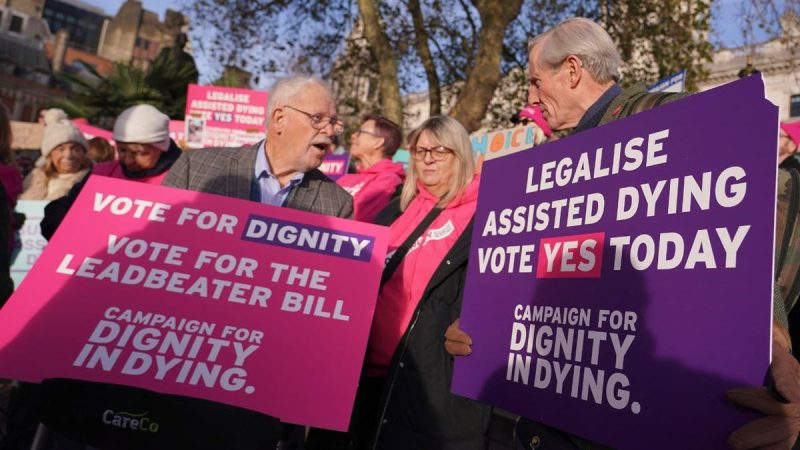This story discusses suicide. If you or someone you know is having thoughts of suicide, please contact the Suicide & Crisis Lifeline at 988 or 1-800-273-TALK (8255).
England and Wales edged closer to legalizing assisted dying after lawmakers approved a contentious bill in the House of Commons on Friday to allow terminally ill adults to end their lives.
Lawmakers voted 330 to 275 in Britain’s lower house for the assisted dying bill, which will now be sent on to further scrutiny in Parliament before it faces a final vote by lawmakers.
The proposed bill would allow people over 18 with less than six months to live to request and be provided with help to end their lives, subject to safeguards and protections.
The vote came after hours of emotional debate that saw personal stories of loss and suffering shared. The sensitive discussion touched on issues of ethics, grief, the law, faith, crime and money and drew large crowds outside parliament as the debate went on.
Although hugely controversial, a majority of Britons support the principle of assisted dying, according to several polls.
Euthanasia or assisted dying has been decriminalized in European countries like Belgium, Luxembourg, Germany, Spain, Austria, and Portugal, according to Euro News. Switzerland was the first country in the world to permit any kind of assisted dying, with the practice being legal since 1941.
It’s also legal in 10 U.S. states: Washington, D.C. and the states of California, Colorado, Oregon, Vermont, New Mexico, Maine, New Jersey, Hawaii and Washington.
Supporters said the law would provide dignity to the dying and prevent unnecessary suffering, while ensuring there are enough safeguards to prevent those near the end of their lives from being coerced into taking their own life.
Opponents, including faith leaders, said it would put vulnerable people at risk of being coerced, directly or indirectly, to end their lives so they don’t become a burden.
Under the proposals, two doctors and a High Court judge would need to verify that the person had made the decision voluntarily. Pressuring or coercing someone into ending their life would be punishable by up to 14 years in prison.
‘Let’s be clear, we’re not talking about a choice between life or death, we are talking about giving dying people a choice about how to die,’ the bill’s main sponsor, Kim Leadbeater, said as she presented the bill to a packed chamber.
She said it could take another six months before a second vote takes place.
‘I will take evidence, written evidence, oral evidence, we’ll get a very thorough, robust bill committee there to scrutinize the bill and make it the best that it possibly can be,’ she told reporters after the vote on Friday. ‘It’ll be a long process… And then, as I said in my speech, there’s a two-year implementation period, so there’s plenty of time to get this right.’
Assessments on how assisted dying will be funded and how it will impact the U.K.’s state-funded public health service, hospice care and the legal system will also have to be considered.
Conservative lawmaker Danny Kruger said he fears that the bill has lots of loopholes and that the safeguards ‘aren’t very strong.’
‘We now have months of further debate and I am hopeful that colleagues who have expressed concerns will either succeed in strengthening the bill to make it safe or they’ll conclude they haven’t been able to do that and then we can defeat it at the later stage, at third reading,’ he said.
U.K. Prime Minister Sir Keir Starmer voted in favor of the bill. He said last month that he was ‘very pleased’ that such a vote was taking place and said his government would remain neutral on the subject and that his MPs would be given a free vote, rather than having to follow a party line, per the BBC.
Others in his Cabinet, including Health Secretary Wes Streeting and the Justice Minister Shabana Mahmood, voted against it. There were similar divisions across other political parties.
Nigel Farage, the leader of Reform UK, said he voted against the measure.
‘I voted against the assisted dying bill, not out of a lack of compassion but because I fear that the law will widen in scope,’ Farage wrote on X. ‘If that happens, the right to die may become the obligation to die.’
The Associated Press and Reuters contributed to this report.
NATO chief urges members to ‘turbocharge’ defense production as he paints picture of a world bound for war
NATO Secretary General Mark Rutte painted a grim picture of the world and called on Europe…














